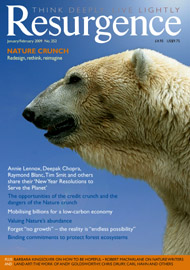THERE SURELY CANNOT, at this stage of the world’s affairs, be many Panglossian optimists believing that more of the same will see us through the perils of climate change, credit crunch, global inequality and affluenza. Nonetheless, working out when and why we went wrong is a much more complicated task than recognising that we have lost our way, and it is a task at which Oliver James excels.
In his earlier book Affluenza he described the toxic consequences which have resulted from the development of a form of super-capitalism that is master, not servant, of humanity, just as finance is now master, not servant, to the economy. In The Selfish Capitalist he lays out his hypothesis in sharper form and provides impressive empirical evidence to support it, as well as indicating how it could be tested further. While parts of the book are deliberately speculative and seek to encourage debate rather than to assert facts, the evidence set out that economic changes since the 1970s have had a seriously damaging effect on emotional well-
being is very compelling.
James distinguishes selfish from unselfish capitalism by the former’s emphasis on short-termism, privatisation of collective goods, minimal regulation and the belief that market forces can meet human needs of almost every kind. His hypothesis, which he presents in a scholarly and scientific way rather than as a party-political polemic, is that this form of selfish capitalism, which has become dominant in the UK, the US and much of the English-speaking world since the 1970s, has markedly failed to increase wellbeing or to promote the common good. Instead it has led to a large increase in emotional distress and mental illness.
He begins by pointing out that citizens of the UK, the US, Canada, Australia and New Zealand are, according to the World Health Organization study of 2004, twice as likely as those of mainland Western Europe to suffer mental illness. He then discusses Erich Fromm’s theory from the 1950s linking emotional distress and materialism, defined as placing a higher value on money, possessions, appearances and fame than on relationships and a more fundamental sense of fulfilment.
The author is at pains to point out that he is talking about materialism that is not concerned with basic survival but with the relative materialism of an already rich society. Whereas Fromm’s theories were not tested at the time he was writing, the links between materialism and unhappiness have been studied more recently in the 1990s. James reports on some of the findings of this work and shows that materialists are more likely to be emotionally distressed, to be emotionally insecure, to have poor-quality relationships, and to be more inauthentic, lacking in autonomy and lacking in self-esteem.
Behind his theory, of course, lies the belief, also now well substantiated by evidence, that mental health is profoundly linked to the kind of family and the kind of society in which people grow up and to their early experiences of life. He points out also that children spend more time in school than they did before, and are tested more often, which also puts them at greater risk of emotional distress – particularly if they are also encouraged at home to be highly competitive.
By creating the label ‘selfish capitalism’ the author deliberately challenges the idea, which is fundamental to much economic theory, that we are naturally selfish rather than altruistic, and suggests instead that our selfishness or altruism is hugely affected by our experiences of family and society.
In the final section of the book, the author describes how supporters of selfish capitalism seek to promote and protect it, for example by rejecting evidence of climate change. He ends, however, with the optimistic belief that widespread disillusionment will lead sooner or later to the emergence of a more unselfish form of capitalism and that sanity will prevail. In particular, he suggests that the starting point of a saner society must be the recognition that we should do all that we can to support parents with young children, whose emotional wellbeing in later life is so dependent on their early experiences and environment.







